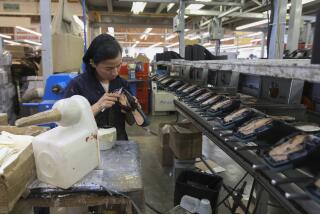A Success, by Several Measures
On Tuesday, when President Clinton presents Congress his third-year report on the North American Free Trade Agreement, he should have no hesitation in declaring the pact a success. The numbers and the politics of the U.S-Mexican-Canadian trade association have proved to be winners.
Just consider U.S. trade with Mexico. Last week, our southern neighbor became the No. 2 buyer of American exports, behind No. 1 Canada and ahead of No. 3 Japan. NAFTA is a regional trade group, and these numbers show that North America is a bountiful trade family.
For instance, U.S. exports to Mexico for April reached $5.7 billion. That represents an increase of 31% over the same month a year earlier. Total trade among the three partners continues to grow at an impressive rate, having reached $435 billion last year. These numbers add up to a sweet deal economically, but NAFTA has a political dimension as well, and both aspects will come under the spotlight in Clintonâs report and Congressâ reaction.
Congress could schedule hearings. The International Trade Commission is already taking testimony on NAFTA, and most of it has been favorable. But some sectors can be expected to question the value of the trade pact. There are legitimate concerns: the jobs picture, environmental aspects, political effects. They should be heard out and investigated where necessary.
Some gains are clear. Consider economic politics. The initial impact of Mexico opening its long-protected economy to free market competition forced many inefficient businesses to close shop. That did not go down well among the Mexican merchant class. But three years later itâs clear that NAFTA has been good for Mexico. Its export economy is on track, and a prosperous Mexico is of course good for the United States in ways stretching from purchasing power to the damper it puts on immigration.
Now, American companies sell more products in Mexico than ever before. And the celebrated âsucking soundâ of American jobs headed south to Mexico that Ross Perot and Pat Buchanan injected into the 1992 presidential campaign? U.S. trade unionists are right to raise the issue, but it hasnât happened, at least in a clearly measurable volume. âIn all sectors, the U.S. economy added 8.9 million jobs since NAFTA,â economist Sidney Weintraub testified before the International Trade Commission.
We think NAFTA is paying off in many ways and expect President Clinton to deliver the same conclusion in his report to Congress.
More to Read
Sign up for Essential California
The most important California stories and recommendations in your inbox every morning.
You may occasionally receive promotional content from the Los Angeles Times.










